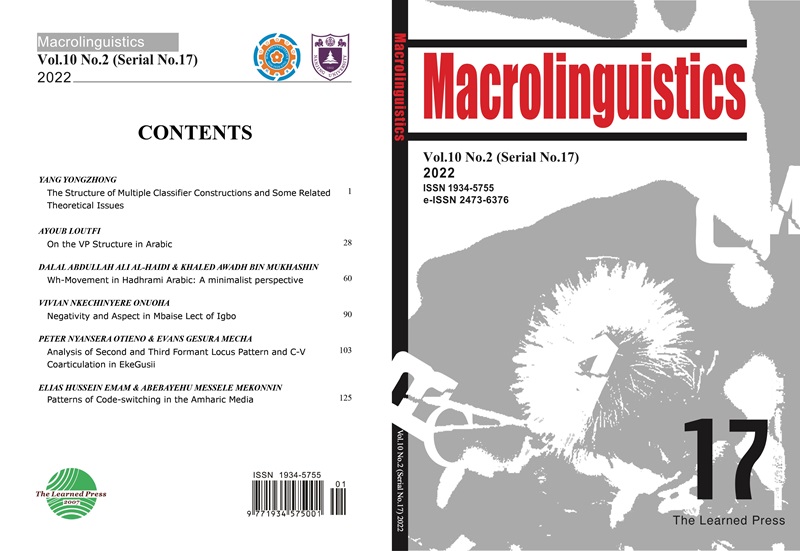阿姆哈拉语和阿法恩-奥罗莫语谚语的比较分析:元传播视角
引用次数: 1
摘要
谚语是人类永恒的智慧,其形式是简明扼要的比喻。它们反映了演讲者的概念体验,尤其是演讲社区中的老年人。本研究旨在从元传播的角度对阿姆哈拉语和阿法恩-奥罗莫语谚语进行比较研究。元交流被概念化为关于交流的交流。沟通被认为与文化有很多共同点,因为它塑造并支配着特定社会的沟通行为。在言语交际中,谚语的使用非常频繁,明确地用来评论交际行为。尽管谚语在几个学科中具有多方面的功能,但本研究的重点是谚语作为语言学和人类学中相关的交流来源。在此基础上,有针对性地选取谚语样本,运用心理分析方法进行分析。在对谚语的分析中,我们建立了谚语语义关系的认知模型。这是因为谚语具有相对稳定、约定俗成和语境意义的形式作为连续体,存在于它们共同的概念基础中。最重要的是,它们作为一个共同的概念基础是隐喻依赖的。因此,阿姆哈拉语和Afaan Oromoo中也有许多谚语评论了沟通、沟通行为或过程等的重要性。因此,在两个民族语言群体中,用这样的谚语来评论交流是很常见的,这往往会显示出每个群体的交流行为。本文章由计算机程序翻译,如有差异,请以英文原文为准。
Comparative Analysis of Amharic and Afaan Oromoo Proverbs: A meta-communication perspective
: Proverbs are timeless human wisdom in the form of concise figurative speech. They reflect the conceptual experience of the speakers, particularly the elders in speech communities. This study aims at presenting a comparative study between Amharic and Afaan Oromoo proverbs from the standpoint of meta-communication perspective. Meta-communication is conceptualized as communicating about communication. Communication is believed to have many things in common with culture in that it shapes and dictates the communication behavior of a given society. In verbal communication, the use of proverbs is quite often, explicitly to comment on communication behavior. Despite the multifaceted functions of proverbs in several disciplines, the focuses of this study are proverbs as sources of communication that are relevant in linguistics and anthropology. In so doing, sample proverbs have been purposively selected based on semantic criteria and analyzed by using psycho-analysis method. In the analysis of the proverbs, we built a cognitive model for their semantic relationships. This is because the proverbs have relatively stable, conventionalized and contextual meaning of form as continuum, residing in their common conceptual base. Above of all, they are metaphor-dependent as a common on conceptual base. Hence, there are a number of proverbs in Amharic and Afaan Oromoo as well that comment on importance of communication, communication behavior or processes, among others. In both ethno-linguistic groups, thus, employing such proverbs to comment on communication is quite common which tend to show the communication behavior of each group.
求助全文
通过发布文献求助,成功后即可免费获取论文全文。
去求助
来源期刊
自引率
0.00%
发文量
83
审稿时长
20 weeks
期刊介绍:
Macrolinguistics (ISSN 1934-5755, e-ISSN 2473-6376) is an international academic journal which is specialized in research papers of non-Indo-European linguistics. It is published biannually by The Learned Press and funded by the Double First-Class Initiative of Nanjing University. It aims at contributing to the complementarity and interaction of linguistic research worldwide.

 求助内容:
求助内容: 应助结果提醒方式:
应助结果提醒方式:


